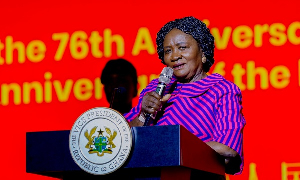By Kwame Okoampa-Ahoofe, Jr., Ph.D.
Garden City, New York
Jan. 21, 2015
E-mail: okoampaahoofe@optimum.net
I find the current practice of churches holding services in basic public schools to be a potentially profitable avenue for our metropolitan, municipal and district assemblies that own and operate these schools. Consequently, I find the recent directive issued to churches to desist from using these public facilities for their services to be woefully bereft of entrepreneurial acumen (See "AMA Bans Churches from Worshipping in Classrooms" Citifmonline.com / Ghanaweb.com 1/22/15).
We are told that the directive follows several incidents in which worshippers have damaged classroom furniture. In other words, these Christian worshippers - or devotees - have become a quality-of-life nuisance to the schools whose operatives have allowed them the use of such facilities. I am assuming that the use of such public property attracts rental fees, which could be used in effecting badly needed maintenance and repair works for which Assembly revenue may neither be forthcoming nor readily available.
If the preceding observation has validity, then it appears to me that stringent rules ought to be laid down to govern the disciplined use of such facilities and rigidly enforced by, for instance, hiring building superintendents and/or monitors to ensure that furniture in these mini-academies is handled with appreciable care. Failure to do so could then be profitably punished in the form of reasonably exorbitant surcharges. I am quite certain that these public facilities are also regularly rented out for non-religious activities, while they are not in active use for the purposes for which they were constructed.
All that needs to be done here, as well, is for facility managers and/or their assigns to take stock of the furniture and document their general condition at the time of rental. And then billing the renters for the cost of any property damage or abuse that may be clearly ascertained to have occurred during the course of the usage of the same. Collectively punishing the users of these facilities with wholesale summary prohibition does not seem to me to be very progressive, justifiable and business savvy. Instead, each group of worshippers ought to be treated on a case-by-case basis, according to how responsible a particular group of worshippers conducts itself.
The various levels of Assemblies or Districts may also do well to consider having these schools re-designed or ones being newly-built designed for multi-purpose uses, so as to make these bona fide public properties communally more useful and profitable as well as functionally relevant. This is what the progressive and utilitarian concept of "Universal Design" and "Modernism" are about. Of course, universal design also implies the user-friendliness of these facilities by the physically challenged or handicapped.
It is about time our community leaders and local politicians kept themselves abreast with the utilitarian tide of the times, or we risk ossifying ourselves out of positive and foresighted societal functionality. A word to the wise....
_____________________________________________________________
Opinions of Friday, 20 February 2015
Columnist: Okoampa-Ahoofe, Kwame














